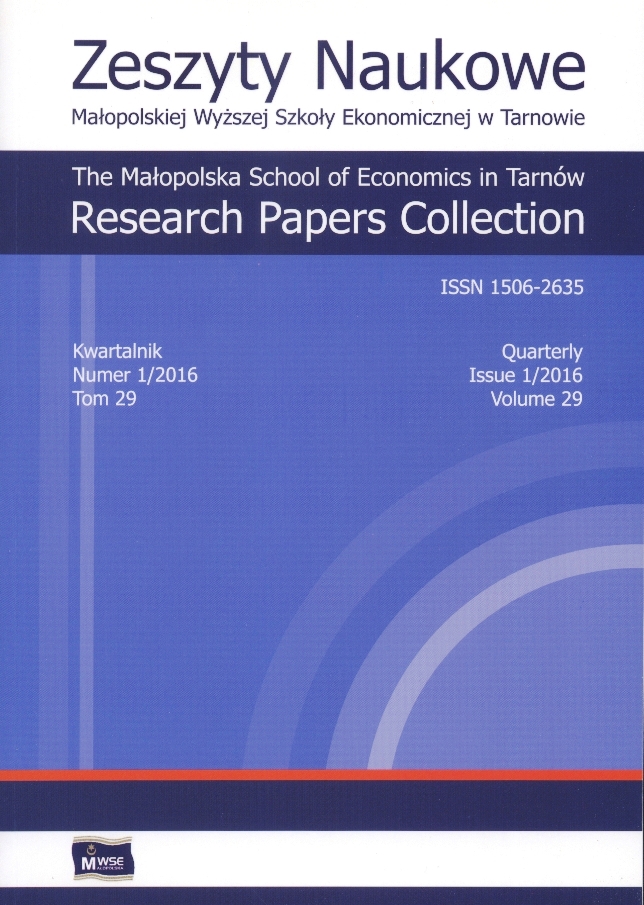Abstract
The article points to the well-being of staff both on the individual level but also on a larger scale as an important factor affecting the implementation of the objectives faced by the organisation. Taking into account the characteristics of the paper as defined in Peter Warr’s vitamin model, Blanchard’s and Walton’s concepts, we are trying to show the management practices that can have a positive impact on the welfare of employees. We analysed management activities in four areas: delegation – understood as the transfer of the superior part of the management functions, work control – currently performed by the superior, aimed at ensuring the proper conduct of the processes within the organisation, evaluation of work and professional development, and respect for the principles and ethical standards, both in relation to employees, as well as office customers. In each case, the analysed area indicates the role of managers in building welfare of their workers and the need to increase the awareness of the management in the field of management actions on the welfare of workers. In this context, the importance of communicative competence of the executives at all levels of management is highlighted, which is the basis for building proper atmosphere of trust and cooperation, both between superiors and subordinates, as well as inside the team of employees.
References
Blanchard, K., O’Connor, M., Ballard, J. (2003). Managing by Values. How to Put Your Values into Action for Extraordinary Results. San Francisco: Berrett-Koehler Publishers. ISBN 9781576752746.
View in Google Scholar
Chappell, T. (1993). The Soul of a Business. Managing for Profit and the Common Good. New York: Bantam Books. ISBN 0553094238.
View in Google Scholar
Cieślikowska, M., Pieczewski, A. (2013). Normy etyczne obowiązujące pracodawców. Perspektywa systemu prawnego, organizacji i pracownika. Annales. Etyka w życiu gospodarczym, 16.
View in Google Scholar
Cozma, I.F. (2011). The relation between globalization and personal values cross 53 countries and 28 years. PhD diss. [online, dostęp: 2016-02-22]. Dostępny w Internecie: http://trace.tennessee.edu/utk.graddiss/1175.
View in Google Scholar
De Jonge, J., Schaufeli, W.B. (1998). Job characteristics and employee well-being: a test of Warr’s Vitamin Model in health care workers using structural equation modelling. Journal of Organizational Behavior, 19(4), 387–407.
View in Google Scholar
Grant, A.M., Christianson, M.K., Price, R.H. (2007). Happiness, health, or relationships? Managerial practices and employee well-being tradeoffs. Academy of Management Perspectives, 21(3), 51–63.
View in Google Scholar
Griffin, R.W. (2002). Podstawy zarządzania organizacjami. Warszawa: Wydawnictwo Naukowe PWN. ISBN 8301120193.
View in Google Scholar
Kalleberg, A.L. (2011). Good Jobs, Bad Jobs: The Rise of Polarized and Precarious Employment Systems in the United States 1970s to 2000s. New York: Russell Sage Foundation Publications. ISBN 978-0-87154-431-5.
View in Google Scholar
Kozioł, L. (1993). Zagadnienia ochrony i humanizacji pracy. Kraków: Wydawnictwo Akademii Ekonomicznej w Krakowie.
View in Google Scholar
Kozioł, L. (2011). Trychotomy of motivating factors in the workplace: Concept outline. Zeszyty Naukowe Małopolskiej Wyższej Szkoły Ekonomicznej w Tarnowie, 19(2), 45–54.
View in Google Scholar
Majcherczyk, M. (2015). Poczucie szczęścia a zaangażowanie pracowników. Personel i Zarządzanie, 7, 24–27.
View in Google Scholar
Michoń, F. (1981). Organizacja i kierowanie w przedsiębiorstwie w świetle socjologii i psychologii pracy. Warszawa: Książka i Wiedza.
View in Google Scholar
Osterman, P., Shulman, B. (2011). Good Jobs America: Making Work Better for Everyone. New York: Russell Sage Foundation Publications. ISBN 978-0-87154-663-0.
View in Google Scholar
Payne, H.J. (2005). Reconceptualizing social skills in organizations: exploring the relationship between communication competence, job performance, and supervisory roles. Journal of Leadership & Organizational Studies, 11(2), 187–194.
View in Google Scholar
Pocztowski, A. (2008). Zarządzanie zasobami ludzkimi: strategie, procesy, metody. Warszawa: PWE. ISBN 9788320816624.
View in Google Scholar
Strykowska, M. (2009). Dobrostan pracowników a zarządzanie współczesnymi organizacjami. Ruch Prawniczy, Ekonomiczny i Socjologiczny, 71(1), 187–194.
View in Google Scholar
Szulczewski, G. (2002). Etyka w biznesie. O możliwościach i barierach stosowania kategorii etycznych. Annales. Etyka w życiu gospodarczym, 5(1), 201–207.
View in Google Scholar
Trzebińska, E. (2008). Psychologia pozytywna. Warszawa: Wydawnictwa Akademickie i Profesjonalne. ISBN 9788360501122.
View in Google Scholar
Walton, R.E. (1985). From control to commitment in the workplace. Harvard Business Review, 63, 77–84.
View in Google Scholar
Warr, P., Clapperton, G. (2010). The Joy of Work? Jobs, Happiness and You. London: Routledge. ISBN 9780415459662.
View in Google Scholar
Wright, T.A., Bonett, D.G. (2007). Job satisfaction and psychological well-being as nonadditive predictors of workplace turnover. Journal of Management, 33(2), 141–160.
View in Google Scholar
© Copyright by Małopolska School of Economics in Tarnów. The articles are available under the Creative Commons Attribution NonCommercial-NoDerivatives 4.0 International License


